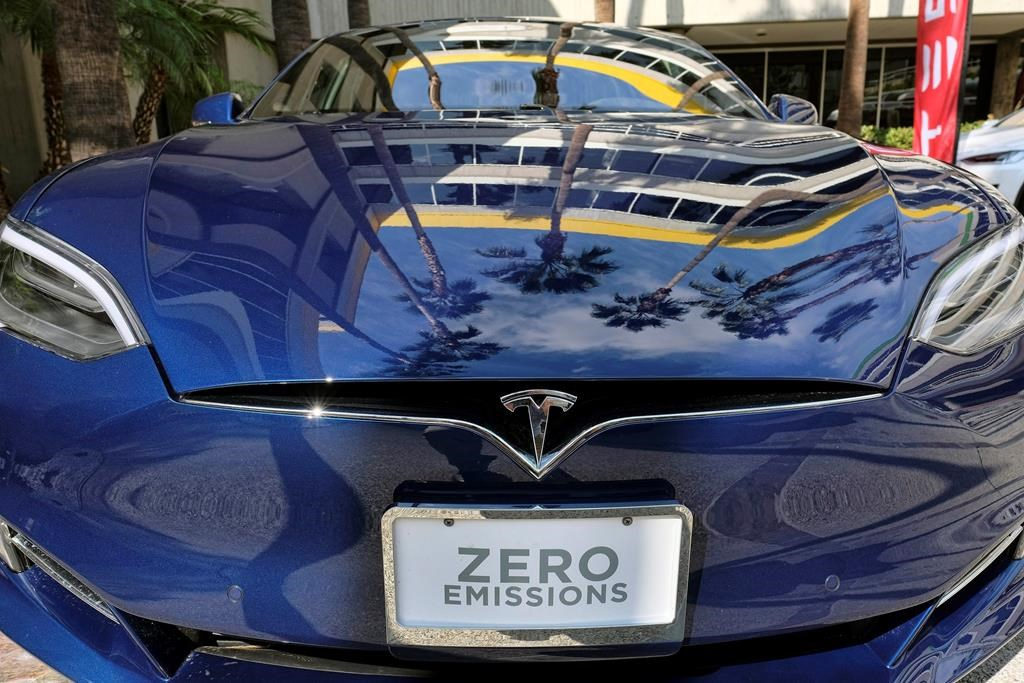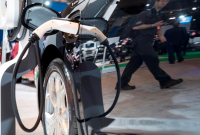Support strong Canadian climate journalism for 2025
Picture this: you’re open to the idea of buying an electric car and have heard rebates are available. But when you go to a dealership, there are no electric cars on the showroom floor and none outside to test drive. The dealer hasn’t heard of any rebates. You leave, wondering what the fuss is all about.
Situations like this are happening all over the country, say environmental organizations promoting a new campaign called EVChoice.ca. Canadians are curious about electric cars, but are not getting the opportunity to try them out, they say.
They point the finger at dealerships and manufacturers for not pumping out enough products or putting enough on display in showrooms to feed consumer curiosity — an accusation the dealers and car companies are denying.
“You’d be hard-pressed to go find a dealership in Ontario now and in other provinces, where you can find one of these cars sitting on the lot that you can get in and test drive,” said Keith Brooks, programs director for Environmental Defence Canada.
“It makes it difficult for somebody to make that choice to buy an electric vehicle, because they’re just not actually there.”
Environmental Defence is one of the groups promoting EVChoice.ca, which encourages Canadians to urge federal and provincial governments to pass laws forcing automakers to sell more electric vehicles. Others are The Atmospheric Fund, Clean Energy Canada, Équiterre, and Simon Fraser University's Sustainable Transportation Action Research Team.
Their push may bring fresh attention to Transport Minister Marc Garneau’s zero-emissions vehicle advisory panel, which has been considering a forced-sales mandate, and other options, ahead of an expected Trudeau government zero-emissions vehicle federal strategy in 2018. The panel has met four times over the summer, Transport Canada has confirmed, and is scheduled to meet a fifth time this month.
As nations try to mitigate climate change and rid themselves of air pollution, a battle over how best to convince people to drive vehicles that don't emit greenhouse gases into the air is playing out worldwide.
Canada’s transportation sector makes up about a quarter of nationwide carbon pollution and Canadians have put a fifth more cars on the road over a decade, according to the federal government.
Ontario, Quebec and British Columbia governments offer tens of thousands of dollars in rebates when purchasing new electric vehicles. But so far, only Quebec has a mandate forcing a certain per cent of its auto sales (3.5 per cent) to come from zero-emissions vehicles for the 2018 model year. Automakers that don’t meet targets can buy credits from others that do.
China is the latest and perhaps most consequential country to consider a ban on the production and sale of fossil fuel cars. France and the United Kingdom are expected to do so in 2040.
Over a quarter of Canadians surveyed could go electric
The SFU sustainable transportation team has concluded that between 20 and 30 per cent of Canadian consumers they surveyed would be interested in buying an electric vehicle, according to director of research Suzanne Goldberg.
That's far higher than the single-digit percentage of sales that electric vehicles currently represent compared to all auto sales in Canada, according to information company FleetCarma. The firm, however, does note that sales climbed in Ontario and Quebec by over 50 per cent compared to the previous quarter.
“A lot of consumers want choice, but right now, the preferences aren’t illustrated or exemplified in terms of the options that are available at the dealership today,” said Goldberg.
Clean Energy Canada executive director Merran Smith said one of the biggest barriers to buying an electric vehicle in Canada today is access.
"If you can’t take the new (all-electric) Chevy Bolt out for a test-drive, or if you need a new car now, but it takes months to even get the one you want delivered, how likely are you to choose an electric vehicle over a more traditional model that you can drive right off the lot?" said Smith.
Michael Hatch, chief economist for the Canadian Automobile Dealers Association, said there was some truth to that. But he said it was unrealistic to expect many electric vehicles deployed at dealerships, given that dealers buy their inventory ahead of time in short bursts.
Dealers stock between 60 and 120 days’ worth of inventory, he said, but sales numbers for zero emissions vehicles are “not much more than zero” right now, and dealers can’t risk putting down that investment with uncertain sales targets.
David Adams, president of Global Automakers of Canada, said it was common to hear complaints that not enough electric vehicles are on the ground at dealerships, but said that was simply a function of inventory.
“At any given time, the situation of what’s on the ground may be very different from any other point in time,” he told National Observer. The end of the 2017 model-year, he argued, means that zero-emissions vehicles from any manufacturer would necessarily drop off.
He said he would dispute that electric vehicles were being consistently under-produced. “Those vehicles are generally available, it might take a little bit more looking, and you may have to go further afield to obtain one.”

Deliberate strategy or inventory issue?
The EVChoice.ca campaign is singling out California as a jurisdiction that is taking an all-of-the-above approach: encouraging consumers by lowering the price initially, while also forcing down emissions of all vehicles, lowering the emissions intensity of fuels as well as forced-sales laws.
“California’s system is really trying to put their transportation sector on a low-carbon pathway by a range of policies that try and address all the different barriers,” said Goldberg. “That’s the type of approach our research shows is most effective.”
Smith said California has figured out that forcing the auto industry to sell more electric vehicles "is one of the best ways to make sure drivers have a variety of non-polluting options to consider when shopping for a new car.
"The state is just slightly bigger than Canada in terms of population and GDP, so despite our obvious differences in terms of geography and climate, California offers a look at how a zero-emissions vehicle mandate could make a difference here in Canada. Thanks in part to its electric-vehicle sales mandate, six times as many electric vehicles were sold in California last year than in Canada."
Brooks of Environmental Defence also argued that demand was already high enough that dealerships were slapping on surcharges for orders, and people were going on wait lists.
Adams confirmed that there were wait lists for electric vehicles. “That’s probably a fair point,” he said.
“What I would say back is, at this point in time — and things will change as that demand continues to increase — manufacturers will put more resources in place to build new facilities to produce vehicles, but that proposition is something that takes 18 months, a couple years.”
In the meantime, he said, there will only be so many vehicles for any given jurisdiction. “When those vehicles are done, they’re done” and a forced-sales mandate won’t necessarily improve supply, he said.
Hatch said dealers were well aware of provincial incentive programs, but with 3,200 stores and 150,000 employees, “not every single employee is going to know about every program that exists.”
He said provincial associations communicate to members the different programs that are available. The Canadian Automobile Dealers Association also sends out magazines and newsletters to dealers each month, he said, keeping members up to date on policies.
Hatch said the “reality of the marketplace” was that manufacturers, while they were producing more electric vehicles, just aren’t putting out enough for dealers to stock.
'A conspiracy theory'
But manufacturers are less inclined to sell electric vehicles because they don’t make as much profit as one larger gasoline-powered vehicles like SUVs and pickup trucks, said Brooks.
He also accused dealerships of being less inclined, as electric vehicles don’t require the same amount of service, having many fewer moving parts. “For the dealers, that’s a huge chunk of their business,” he said.
Hatch called that a “conspiracy theory.”
“Dealers that I know are eager to sell these things if they can get their hands on them,” he said. “They recognize, as do most people in the industry, that this is the future.”
Adams agreed that some manufacturers are incurring losses on electric vehicle sales. “That’s certainly a challenge” for those companies, he said. But he called electric vehicles part of a “niche” market, regardless of their technology, akin to buying a fancy sports car.
“Anybody going to a Chevrolet dealership might not necessarily find a Corvette at that dealership,” he said.

Federal advisory panel has met four times
Transport Canada's federal advisory panel on zero-emissions vehicles met four times between April and August.
Marie-Anyk Côté, senior media relations advisor for the department, said the panel met April 28 and June 27 over conference call, and May 15 and Aug. 1 during meetings in Ottawa.
The panel is expected to hold one more face-to-face meeting in Ottawa this month, Côté confirmed. She said it's "not known at this time if additional meetings will be required."
It had originally been expected to produce recommendations by this fall, but Côté wouldn't confirm that timeline.
She said the panel "will continue to provide advice to federal, provincial, and territorial government officials on possible measures for consideration" and the strategy itself is expected to be finalized next year.
Adams said the government has asked stakeholders to keep a lid on discussions, as five subcommittees work through various aspects of the strategy for how to improve the market rollout of electric vehicles.
But even though discussions are secret, its clear the panel’s members — who represent manufacturers, dealers, universities, non-profits and others — aren't yet on the same page.
“You’re never going to get everybody around these tables to agree on everything," said Hatch. "Ultimately, the government's going to have to decide, one way or the other, what its policy is going to look like, but it’s been a positive process for sure."






Comments
I do not believe there is a conspiracy, but I know for a fact that the inventory is simply not there. In July, when we were rear-ended, and thought our car would be written off, I thoroughly researched what EVs were available to me here in Ottawa with a range of 200km or more. None! The VW e-Golf, may be available in 9 months. Teslas? Get on the waiting list, if you have the money. Bolt? As elusive as the eastern Cougar. More a rumour than something anyone has spotted in the Ottawa region. Nissan Leaf? They could get one in from Toronto, but at a higher trim level that would add $10K to my bill and only 160km of range; and who wanted a 2017 Leaf when a major upgrade was about to be unveiled? I did not research the others with lower range, because anything under 200 km was just not going to meet our needs. It's a chicken and egg. We want to be early adopters and help drive demand, but can't do that without supply. I have heard the same story from a number of friends. So we're on the waiting list for the new Leaf, and will see if there are any Bolt or e-Golf sitings in the meantime.
After several years of considering the switch to a green car - I took the leap (financial and moral) but the best I could do was a 2 year old plug-in hybird. It is well built but unbelievably complex. Its battery only mode gets 47 km before it switches over to a gas power plant with inertial driven battery assist. In a recent 1000km trip we used roughly half the gas we would have used in my previous quite efficient and reliable mid sized vehicle. We are impressed with the new car's performance, both its efficiency and its drivability. Not only green but fun to drive. Premier Ford's decision to end the electric powered vehicle rebate is precisely what one would expect from a stuck in the tar pit dinosaur. Let's make sure he and his fellow travellers all wind up in the pits.
Well put, Betsy! This whole stuck-in-the-tarpit mentality is SO FRUSTRATING!! Having turned in my 15-year-old minivan for a hybrid Highlander - a fantastic vehicle, and the only comparable one with ANYTHING electric about it - 10 years ago, I can honestly say that memories of the documentary, "Who Killed the Electric Car" continue to plague me! As well, I am on the strata council of our condo complex, and am continually meeting walls erected by other less-progressive and informed members in getting charging stations installed in our parkade! This even after at least one other owner has repeatedly enquired about purchasing an E V! One good note: there's some progress in such displays as the Vancouver International Auto Show! This year's had all the E Vs in their own more spacious separate area, surrounded by information about how many more public charging stations were being built in B. C.!
We continue to visit the Tesla showroom in downtown Vancouver to drool over the Model X, which, so far, is the only model with the kind of range needed here in spacious Canada...
We have an electric car. But it took some phoning around to find dealerships that had them. We drove from Fredericton to Saint John to test drive the Mitsubishi i-Miev and the Nissan Leaf (used). We ended up with an i-Miev. Now we have to get it back down to Saint John every year for service. But we hope the local Mitsubishi will soon be certified to work on the EVs.
I don't think it's a conspiracy theory that conventional car makers don't make money on EVs, it's a fact. After all, I don't see any of them opening the books to show where the profits are coming from. The dealers are making their money mostly from repairs, and of course there are very few repairs to be made on EVS. The whole auto industry is not interested in EVs and only put out a single all electric EV model so they can say their in the market. The fewer they sell, the happier they are. It's only Tesla that is serious about EVs, since that's all they do. Also, while they want to make a profit too, and they're on a mission to change the transportation section and it shows. Just go into a Tesla dealer and see the difference.
If you don't believe this is a conspiracy, just watch this documentary from 2006. it shows you that reliable EV cars were already a reality in the late 1990's.
http://watchdocumentaries.com/who-killed-the-electric-car/
If you don't believe this is a conspiracy, just watch this documentary from 2006. it shows you that reliable EV cars were already a reality in the late 1990's.
http://watchdocumentaries.com/who-killed-the-electric-car/
The conspiracy theory isn't that far fetched. If you haven't seen it yet, watch "Who Killed the Electric Car?" and you will see how dark this situation can really be. I have a Smart ForTwoEV, bought in Victoria BC that wasn't that difficult to find, but the selection was definitely limited. I hope Tesla, once they manage mass production changes this issue by putting the fire under other manufacturers to produce more economical EV's for everyone. All that aside, I do feel we have to stay aware of what the oil industry/auto industry is capable of.
Okay. Currently, just a little under two years later, very few electric and even hybrids are available for purchase in Toronto. Why? A few available outside of the city. Clearly there is a problem here.
But with whom? And the ads for 2020 vehicles are for gas fuelled transportation.
How to fix it?